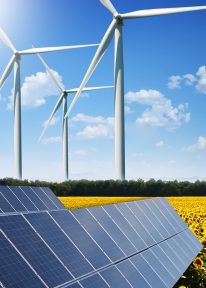Within the VDE ETG committee for electrical energy generation and storage, issues regarding the centralized and decentralized generation and storage of electrical energy are discussed among experts and professionally interested members.
The committee
- organizes subject-specific conferences,
- comments on current issues associated with power generation and storage,
- prepares publications and specialist articles,
- evaluates development levels and market potentials of technologies.
Join us now as a member and contribute to the work of the committee.
Your membership of the committee for electrical energy generation and storage will enable you to
- join professional discussions,
- present yourself personally and contribute your views, ideas and expertise,
- upgrade your knowledge,
- gain professional support.
The committee is looking forward to your engagement!
Your membership of the committee for electrical energy generation and storage offers you
- participation in the exchange of experience and the active transfer of expertise regarding essential issues associated with the Energiewende,
- many opportunities to establish and maintain networks and interdisciplinary contacts, and
- admission to national and international connections to other expert associations and organizations in the fields of science and technology.
Our committee is looking forward to making your acquaintance!
- a technical interest in the subject,
- your expertise, and
- your readiness to become actively involved.
Your commitment is required
Participate in professional discussions
[polylang lang=”en”]Contact[/polylang][polylang lang=”de”]Kontakt[/polylang]
VDE e.V. Energietechnische Gesellschaft (ETG)
Stresemannallee 15
60596 Frankfurt / Deutschland
Tel +49 69 6308-346
etg@vde.com
www.vde.com/etg
[polylang lang=”en”]You might be interested in[/polylang][polylang lang=”de”]Das könnte Sie
auch interessieren[/polylang]
Downloads
- How can the energy mix in Germany be sensibly developed between 2020 and 2050 in order to meet the political goals of the energy transition?
- In addition to the annual averages, what do the annual maximum and minimum generation look like for each type of generation?
- Which expansion of the fluctuating renewable energies sun and wind makes sense?
- What role do other renewable energies such as water, biogas, geothermal energy, etc. play?
- How much secure performance does the energy system in Germany need?
- How can the secured output be generated with as little CO2 as possible?
- Which dynamic properties must the guaranteed output have in order to match the fluctuating generation?
- With which technical developments can individual types of generation be made even more economical?
- How much storage space and other flexibilities does the energy system need, both in the course of the day and in the course of the year?
Furthermore, professionally relevant detailed topics and detailed questions are to be dealt with in the context of the ETG focus topics sector coupling, electromobility and digitization.
